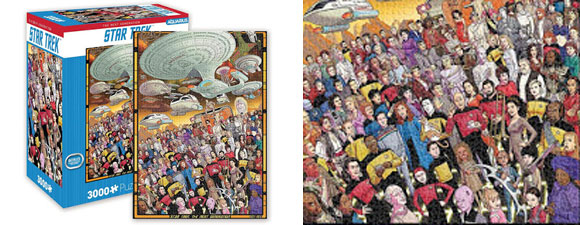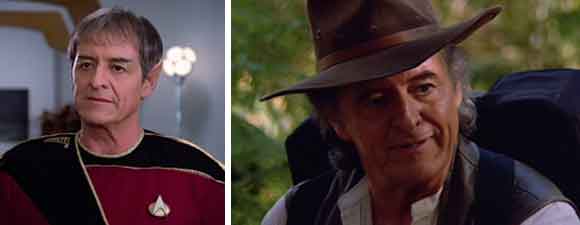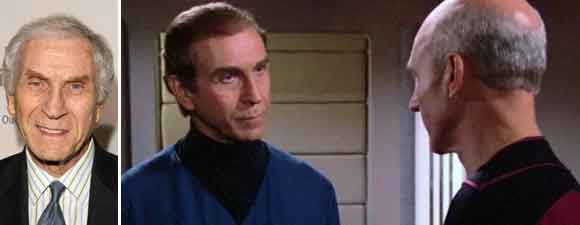Retro Review: Descent, Parts I and II
8 min readWhen the Borg return to battle Starfleet, they have human emotions and give the same to Data.
Plot Summary: A distress call from Ohniaka III leads the Enterprise to discover that Borg have attacked the outpost, though these Borg call each other by name and demonstrate a sense of individuality. When Data is attacked, he becomes angry and violently kills his attacker. On the Enterprise after the Borg flee into a subspace conduit, he is unable to recreate that emotion or any other. When the Borg attack another Federation outpost, the crew encounters the same emotional Borg, who disappear into the same subspace conduit. A Borg who attempted to board the Enterprise is captured and identifies Data by name. In the brig, he explains that his name is Crosis and that the new Borg leader has changed the Collective – they now destroy inferior beings instead of assimilating them. Crosis manipulates Data with a signal as he convinces Data that to feel emotion again, he must kill again. Data flees the Enterprise with Crosis in a shuttlecraft, pursued by the Enterprise, which emerges from a subspace conduit near an unknown planet 65 light years away. There, an away team finds the abandoned shuttlecraft and Picard begins a planet-wide search for Data, assigning nearly all crewmembers to beam down because the planet cannot be scanned from space. Picard, Troi, and LaForge discover what appears to be an abandoned building. They are trapped by a group of Borg under the command of Lore, Data’s “brother” and fellow android, who has Data under his control as well.
Dr. Crusher has command of the Enterprise and its skeleton crew. When the Borg attack, she beams up most of the away teams and takes the ship to hide in the atmosphere of the planet’s sun, using an experimental shielding technique. Riker and Worf remain on the planet, searching for Picard, and encounter a group of Borg led by Hugh, whom LaForge named when the Borg was rescued by the Enterprise and befriended several crewmembers. Hugh explains that when he returned to his ship with a sense of individuality, the Collective fell apart until Lore took over and gave the Borg a new sense of identity. Hugh resents the Enterprise crew for this and refuses to help Riker, though he agrees to show him where Picard is being held once he learns LaForge is among the captives. Meanwhile, Data keeps Picard and Troi locked up and begins to experiment on LaForge, whose attempts to remind Data of their shared friendship are met with apathy. LaForge suspects that Lore is triggering Data’s negative emotions using a transmitter and guesses that an energy pulse might reset Data’s ethical programming. Picard and Troi steal a transmitter and emit the pulse with it, causing Data to express ethical concerns to his brother. Lore announces that Data must prove his loyalty by killing Picard, which Data refuses to do, for which Lore sentences Data to death. But before he can execute Data, Hugh arrives with weapons, and in the ensuing fight, Riker and Worf free Picard and Troi. Data chases Lore, who tries to kill him, making Data conclude that he must deactivate and disassemble Lore. Picard persuades Hugh that he can be the new leader of the Borg. Back aboard the Enterprise, Data tells LaForge that he will never use the emotion chip designed for himself and stolen by Lore, now that he knows emotions can make him hurt his friends.
Analysis: I’ll admit up front that “Descent” is not one of my favorite Next Generation two-parters. It’s the darkest storyline for a major character all series, and it’s exceptionally violent, even if most of the horror takes place offscreen. The only real levity comes at the very start, when Data plays holographic poker with Newton, Einstein, and Stephen Hawking (the latter played by himself) with Newton’s stuffy irritation at the game contrasting with Einstein’s humor and Hawking’s pride at winning before a Red Alert cuts off the game. A red-shirted ensign – all right, a gold-shirted ensign – becomes the first to die in an episode with a very high body count, and then Data commits a bloody act of murder, strangling and beating to death an attacker who knows his name. Riker’s biggest concern upon returning to the ship isn’t the dead crewmember or Data’s behavior, though: it’s the change in the Borg, since, as Troi says, the only Borg with a name was Hugh at they gave it to him. Specifically, LaForge gave it to him, and that friendship becomes central to the crew’s survival. LaForge’s friendship with Data, however, gets tossed aside, and though LaForge and the others are quick to forgive and forget afterward, I’ve never found it so easy to erase the images of Data as a sadistic murderer craving emotion and sensation more than any other aspect of what it means to be a human being. Data’s behavior with the Borg Queen in First Contact seems subtle and reasonable compared with this.
Really, “Descent” is nobody’s finest moment except Crusher’s – I love getting to see her in command of the ship and I love that she puts her knowledge of experimental solar shielding to use, saving the ship and crew in the process. It seemed odd in “Suspicions” for the ship’s doctor to be so interested in metaphasic shielding, yet now we see that she’s competent in all areas of science and technology aboard the ship, and if her leadership style isn’t as polished as Picard’s or Riker’s, it’s still both collaborative and decisive. Not so Picard this episode, whose reaction upon hearing about the change in the Borg collective is not relief that they’re no longer assimilating everyone they see, but anger at Riker as messenger and regret that he didn’t use Hugh to kill all the Borg when he had the chance. Admiral Nechayev comes aboard to make the same accusations Picard has already leveled against himself, and I really have to wonder why it took Starfleet so long to question him; I would think that Picard would already have faced a board of inquiry for not striking against Starfleet’s deadliest enemy or at the very least for not bringing Hugh in to a starbase so other scientists could have the opportunity to learn from him. The state of war between Starfleet and the Borg has never been resolved, no more than Picard’s feelings about having been Locutus have been resolved. Perhaps it’s this guilt that drives the captain to lead an away team into the heart of the crisis, where it’s actually a nice change to see that he can’t do a thing. So often the crew faces disaster, then Picard shows up, makes a speech and saves the day. Here, no one is listening to his speeches, and LaForge and Troi do fine without him figuring out how to approach Data.
As plotting goes, this two-parter is a strong one – most of the major cast members have significant things to do if not significant character development, and there’s well-paced action throughout. But there’s scant humor – really, the funniest line in the two-parter is Data’s explanation to Troi that in his quest to experience emotion, he watched two bad comedies, then tried porn, but nothing happened (and Marina Sirtis’s facial expressions are priceless). He’s just made the discovery that he’s turned on by killing, which is creepy and seems nearly the opposite of Data. Things just get worse when he decides he’d kill Geordi just to experience that rush of emotion again – I don’t care whether his ethics program is being compromised and Lore is feeding him a carrier wave with emotion he doesn’t know how to handle, he’s had damage to his circuits before that have made him act out and he’s been smart enough to have LaForge or Crusher figure out physically what’s going on. Emotion in Data seems to operate like a drug…in fact, ironically, with emotions it becomes less possible to think of him as human and more as something to be switched on and off. Suddenly he’s not Data but the android, presumably the only person on the ship who can be disabled or turned into a killing machine with a carrier wave. Suddenly Picard looks like a fool for letting his android spend time alone with an incarcerated Borg who knows his name. Some of the best episodes of this series have been about Data’s personhood, in a personal sense, a legal sense, a social sense. Yet his evil twin has always hinted at the scary side of artificial life forms, the Clone Wars/Terminator possibilities. “Descent” seems determined to ask whether we actually want someone like Data to have emotions.
Brent Spiner gives a wonderful performance as the villain, but his Data seems too much like Lore even after the ethical program is supposed to be working. I’m more convinced by Lore’s declaration that he loves Data – even though we know Lore to be a consummate liar and manipulator – than I am by Data’s halfhearted renunciation of emotion, something we know won’t last, particularly after Generations and First Contact. Most of what we will see of Data’s experiences with emotion are pretty dark, which to a large degree is true of Seven of Nine as well once she joins Voyager’s crew. There’s little joy, no unrestrained hilarity, and love is always complicated and conflicted. Maybe that’s realistic or even inevitable for someone with little experience of emotion during formative years, but it makes me not look forward to episodes focusing on the development of such characters; it lacks the hopeful approach to character that Star Trek generally offers, the idea that people are fundamentally generous and joyous, and will outgrow, both as individuals and as societies, any tendency toward prejudice or hatred. The Borg in “Descent” seem both diminished and even more horrifying – they may have acquired some sense of individuality, but they are capable of expressing it only in terms of rage, jealousy, fear, scorn…even what passes for patriotism is overwhelmed by darker elements, fervent worship of an elevated leader and loathing of all outsiders. Hugh may still feel friendship for Geordi, but in the vacuum left by Lore, will he be able to teach the others how to think and feel for themselves without destroying one another? What sort of leader will Hugh become now that his inexperienced, childlike mind has had a taste of power? He and Data have both called LaForge their friend, yet neither ever makes the sorts of leaps in the name of friendship that we take for granted from the supposedly unemotional Spock where Kirk and McCoy are concerned. It makes the ending feel rather hollow to me.






